HR Analysts play a key role in managing and interpreting human resources data to help organizations make informed decisions. They analyze trends, generate reports, and provide insights that can improve employee satisfaction and organizational efficiency.
Skills required for an HR Analyst include proficiency in data analysis tools, strong attention to detail, and excellent communication abilities. These skills help them to accurately interpret data and effectively convey their findings to stakeholders.
Candidates can write these abilities in their resumes, but you can’t verify them without on-the-job HR Analyst skill tests.
In this post, we will explore 8 essential HR Analyst skills, 10 secondary skills and how to assess them so you can make informed hiring decisions.
Table of contents
8 fundamental HR Analyst skills and traits
The best skills for HR Analysts include Data Analysis, Statistical Knowledge, HR Metrics, Reporting Skills, Survey Design, Predictive Analytics, Technology Proficiency and Problem Solving.
Let’s dive into the details by examining the 8 essential skills of a HR Analyst.
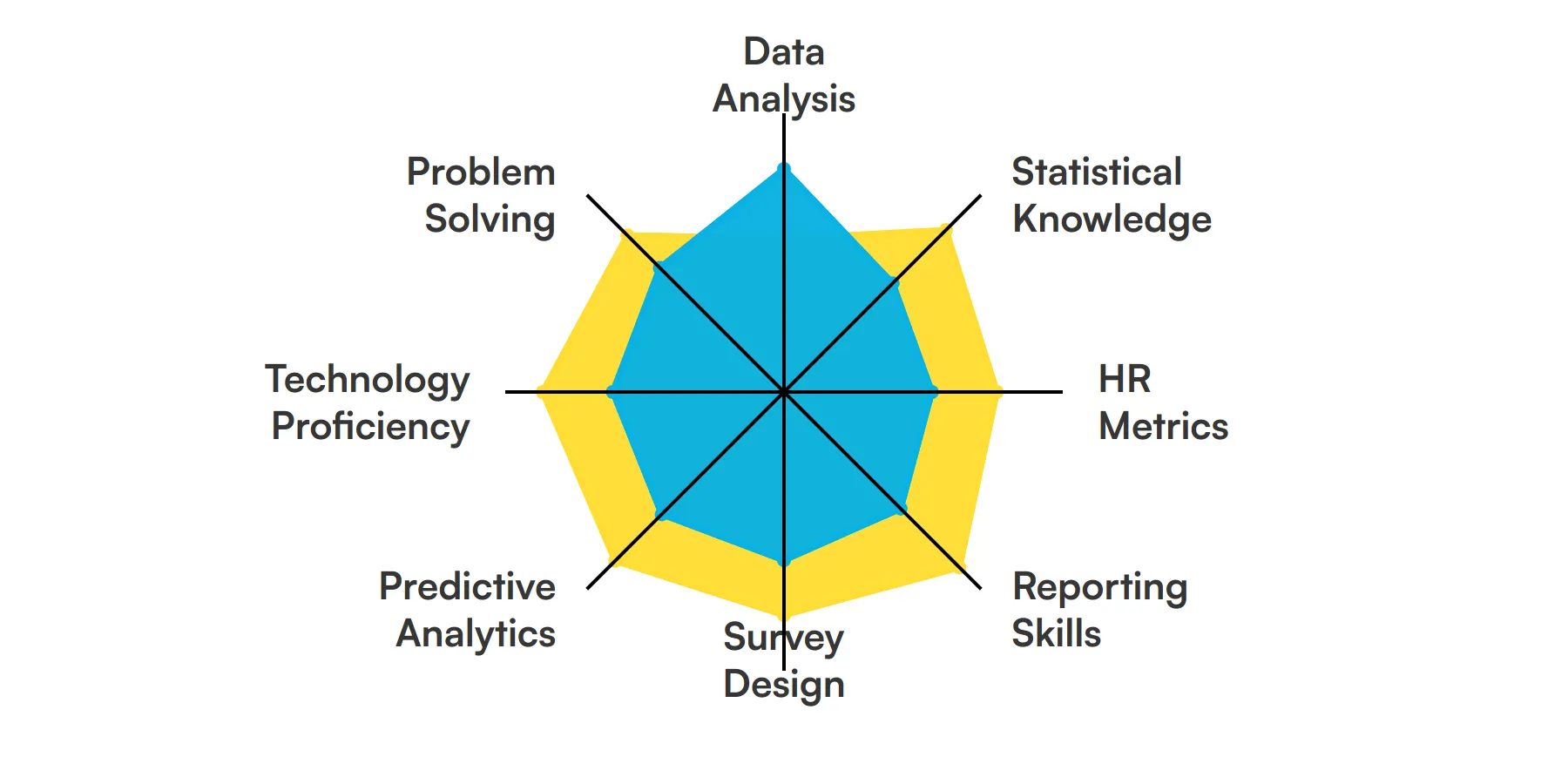
Data Analysis
HR Analysts must be adept at interpreting data to derive actionable insights. This involves using statistical tools to analyze workforce data and trends, which helps in making informed decisions about recruitment, retention, and employee development.
For more insights, check out our guide to writing a Data Analyst Job Description.
Statistical Knowledge
Understanding statistical methods is key for HR Analysts as it allows them to accurately assess and predict employee behavior and organizational needs. This skill is used to validate the effectiveness of HR initiatives and policies.
HR Metrics
HR Analysts use specific metrics such as turnover rates, employee satisfaction, and cost-per-hire to measure the success of HR practices. This skill is crucial for reporting to management and guiding strategic decisions.
Reporting Skills
Creating detailed reports is a daily task for HR Analysts. They need to present complex data in an understandable format that stakeholders can use to make decisions. Effective reporting involves both visual and textual communication skills.
Survey Design
Designing and implementing surveys is essential for gathering data directly from employees. HR Analysts use this skill to capture insights on employee satisfaction, engagement, and other critical HR topics.
Predictive Analytics
HR Analysts increasingly rely on predictive analytics to forecast future trends and employee needs. This skill involves using historical data to make predictions about future HR challenges and opportunities.
Technology Proficiency
Proficiency in HRIS (Human Resources Information Systems) and other data management tools is necessary for HR Analysts to efficiently gather and analyze data. This skill ensures accuracy and accessibility of employee data.
Problem Solving
HR Analysts frequently encounter data discrepancies and complex issues requiring thoughtful solutions. Strong problem-solving skills enable them to identify, analyze, and resolve these challenges effectively.
10 secondary HR Analyst skills and traits
The best skills for HR Analysts include Communication, Attention to Detail, Project Management, Ethical Judgment, Adaptability, Collaboration, Legal Knowledge, Continuous Learning, Multitasking and Innovative Thinking.
Let’s dive into the details by examining the 10 secondary skills of a HR Analyst.
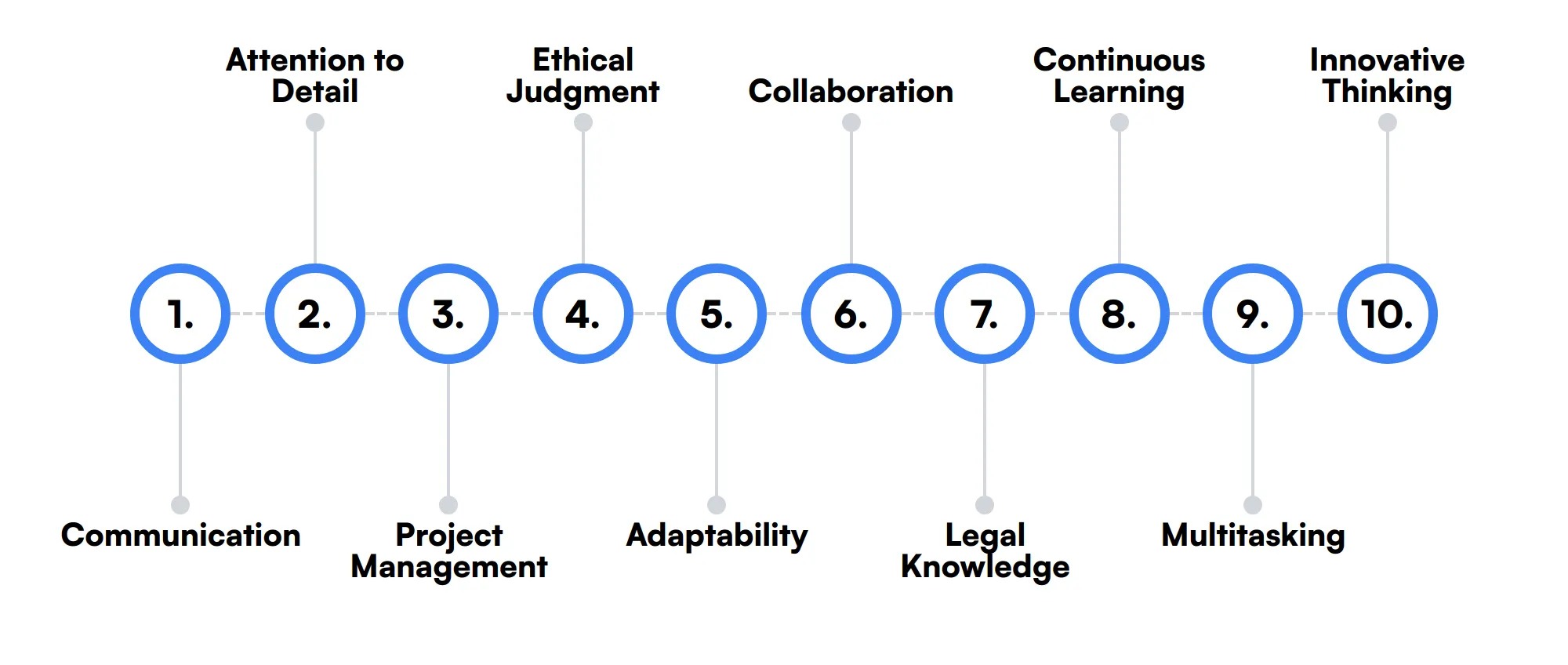
Communication
Effective communication is necessary for HR Analysts to convey findings and persuade stakeholders of their recommendations.
Attention to Detail
This skill ensures that data is accurately collected, analyzed, and reported, minimizing errors in HR decision-making processes.
Project Management
HR Analysts often lead projects like employee surveys or the implementation of new HR systems, requiring good project management skills to meet deadlines and objectives.
Ethical Judgment
Handling sensitive employee data responsibly and making ethical decisions is a key aspect of the HR Analyst role.
Adaptability
The ability to adapt to new technologies and changing data landscapes is important for staying effective in the HR Analyst role.
Collaboration
Working with different departments and teams is common for HR Analysts, making the ability to collaborate smoothly a valuable skill.
Legal Knowledge
Understanding employment law and compliance is important for HR Analysts to ensure that data handling and HR practices adhere to legal standards.
Continuous Learning
The HR field is constantly evolving, and HR Analysts need to continuously update their skills and knowledge to keep up with new trends and technologies.
Multitasking
HR Analysts often handle multiple projects and tasks at once, requiring effective multitasking abilities to manage their workload efficiently.
Innovative Thinking
The ability to think creatively helps HR Analysts develop new methods for data analysis and problem-solving, enhancing HR functions.
How to assess HR Analyst skills and traits
Assessing the skills and traits of an HR Analyst requires a comprehensive approach, as these professionals need a blend of technical and analytical abilities. It's not just about what they know, but how they apply their knowledge to solve real-world HR problems. From data analysis and statistical knowledge to HR metrics and reporting skills, each aspect plays a significant role in their daily tasks.
Traditional resumes and interviews might not fully capture an HR Analyst's proficiency in areas like survey design, predictive analytics, and technology proficiency. This is where skills-based assessments come into play. By using targeted assessments, you can get a clearer picture of a candidate's capabilities and how they might perform in your specific role.
For instance, Adaface assessments can help you evaluate these key skills effectively, leading to a 2x improved quality of hires and an 85% reduction in screening time. These assessments are designed to test real-world problem-solving abilities, ensuring that you find the best fit for your HR team.
Let’s look at how to assess HR Analyst skills with these 6 talent assessments.
Data Analysis Test
Our Data Analysis Test assesses a candidate's ability to handle, modify, analyze, and interpret data. This test is designed to screen for experience with analyzing data to find possible outcomes, detect anomalies, extract meaningful insights, project estimates, and visualize data using charts and graphs.
The test evaluates skills in data modelling, data analysis, business analysis, data interpretation, and SQL. Candidates will navigate through scenario-based MCQ questions that cover data analysis, business analysis, data interpretation, and SQL.
High-scoring candidates demonstrate proficiency in using popular data tools like Excel and show a strong understanding of data operations, investigations, and queries.

Statistics Test
Our Statistics Test evaluates a candidate's understanding and proficiency in statistical concepts and analysis. It covers topics such as statistical methods, data analysis, numerical reasoning, and quantitative aptitude.
The test assesses knowledge in statistics fundamentals, inference, data sampling, regression, and probability. Candidates will answer MCQs that test their grasp of statistical methods and data analysis techniques.
Successful candidates show a strong understanding of exploratory data analysis and non-parametric statistics, demonstrating their ability to apply statistical concepts to real-world scenarios.
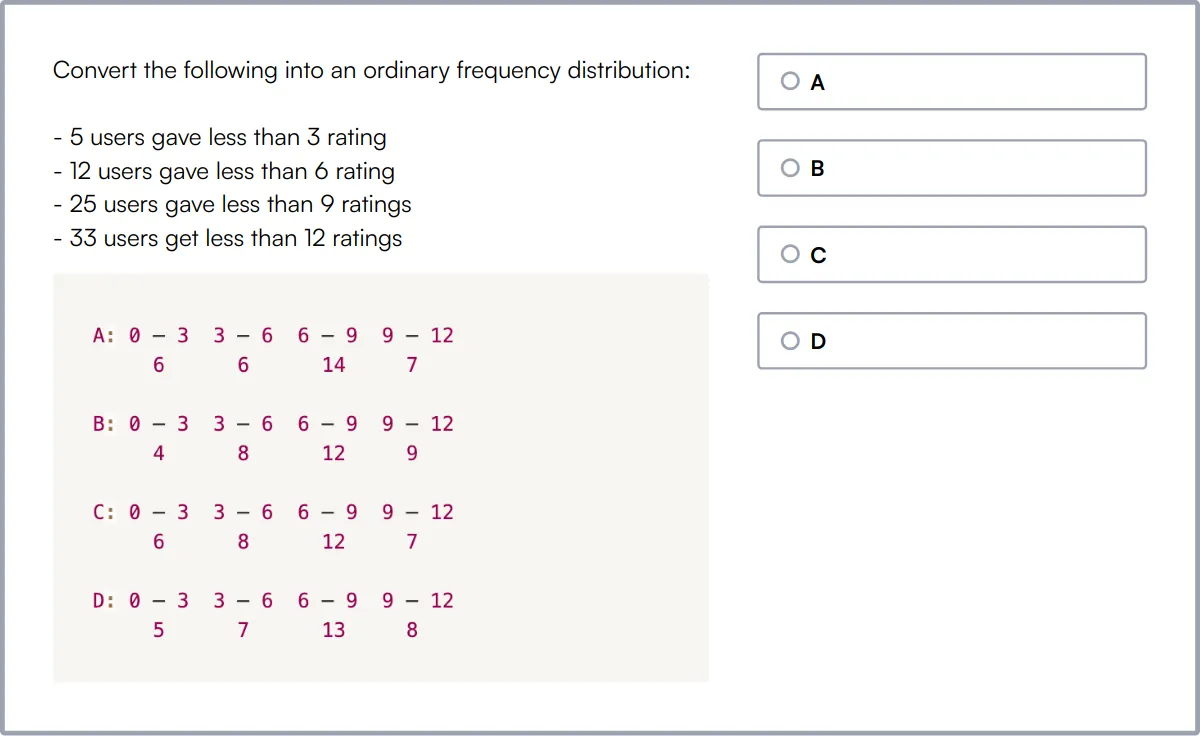
HR Test
Our HR Test evaluates a candidate's ability to address common workplace challenges in staffing, aligning employee behavior with business goals, and utilizing HR software to provide comprehensive support to management and staff.
The test covers human resource management fundamentals, talent acquisition, critical thinking, abstract reasoning, and situational judgement. Candidates will navigate through MCQs that assess their HR knowledge and problem-solving abilities.
High-scoring candidates demonstrate strong conflict management skills and talent pipeline management, showing their capability to handle HR responsibilities effectively.
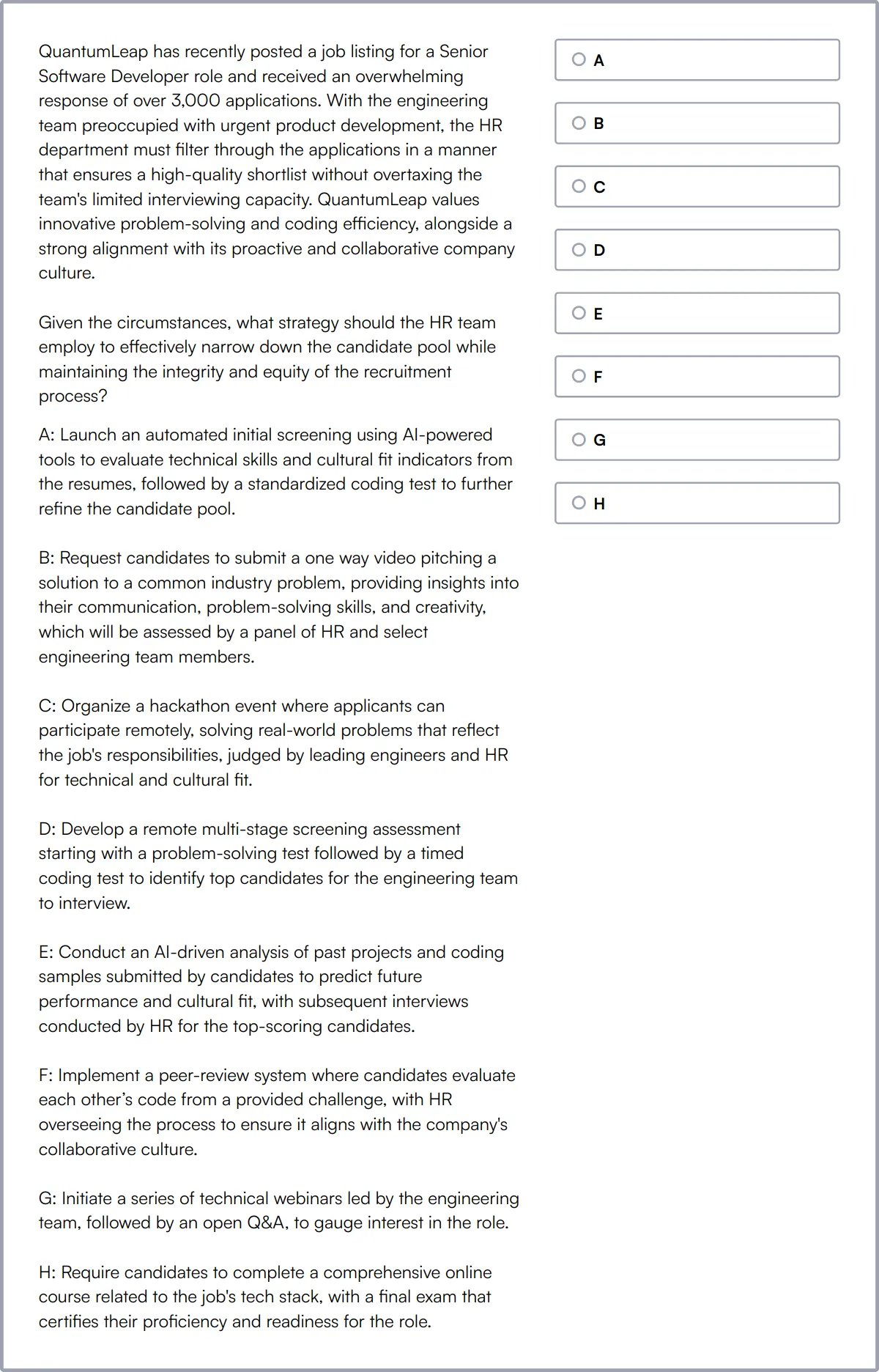
Excel Test
Our Excel Test uses scenario-based MCQ questions to evaluate a candidate's ability to work with large datasets in Excel, navigate multiple spreadsheets, use advanced formulas, and create reports.
The test assesses skills in basic and advanced formulas, data types, analyzing data, visualizing data, and automation with macros. Candidates will be tested on their ability to sort/filter data, analyze data using PivotTables, and create dashboards using charts.
Successful candidates show proficiency in error handling, data validation, and using user form controls, demonstrating their ability to manage and manipulate data effectively in Excel.
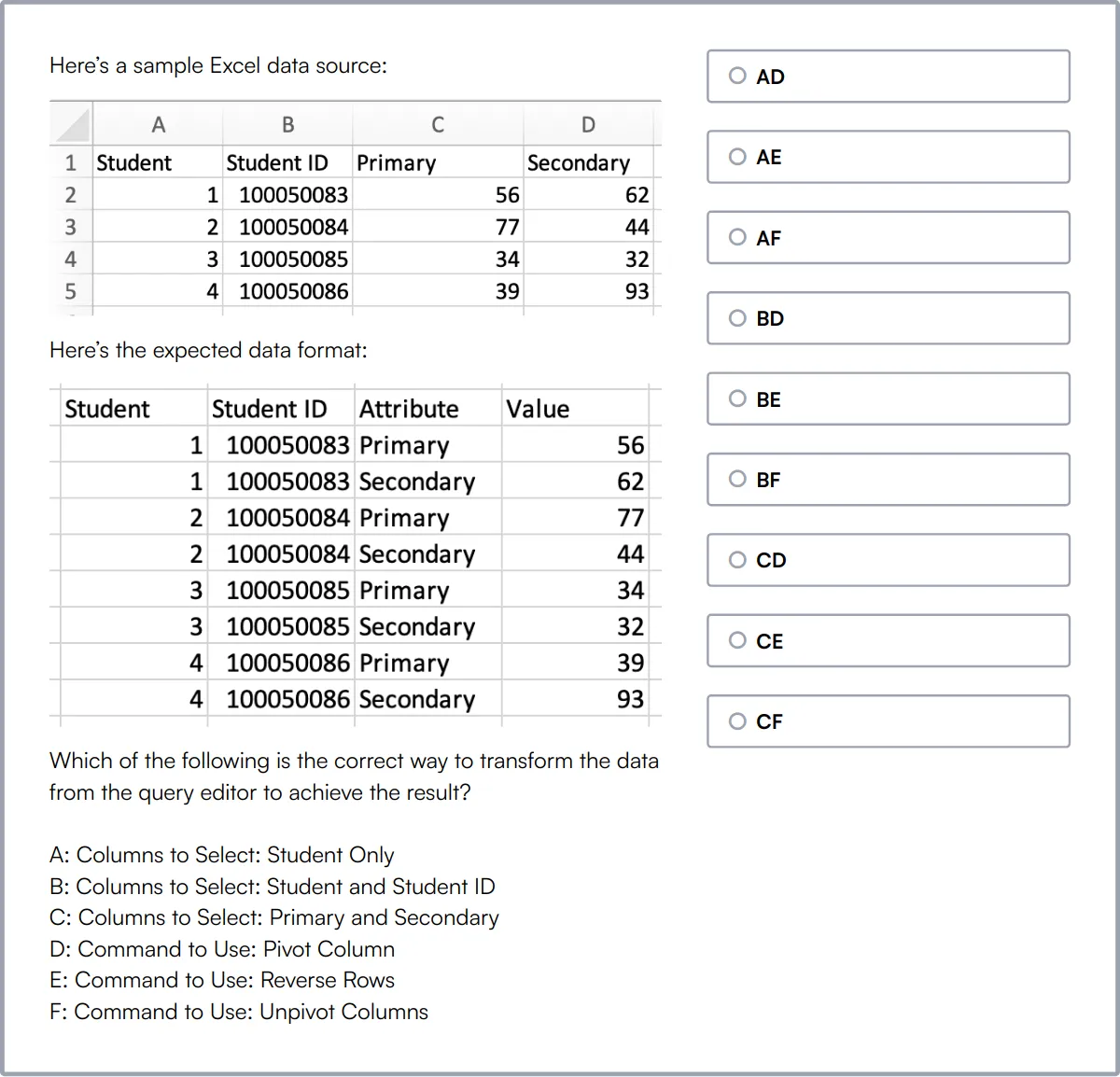
Data Science Assessment Test
Our Data Science Assessment Test evaluates a candidate's proficiency in statistics, probability, linear & non-linear regression models, and their ability to analyze data and leverage Python/R to extract insights from the data.
The test covers machine learning techniques, data visualization, analytics with R or Python, exploratory data analysis, and predictive modeling. Candidates will answer MCQs that test their data science knowledge and practical skills.
High-scoring candidates demonstrate strong data manipulation and data cleansing skills, showing their ability to handle complex data science tasks and extract meaningful insights.
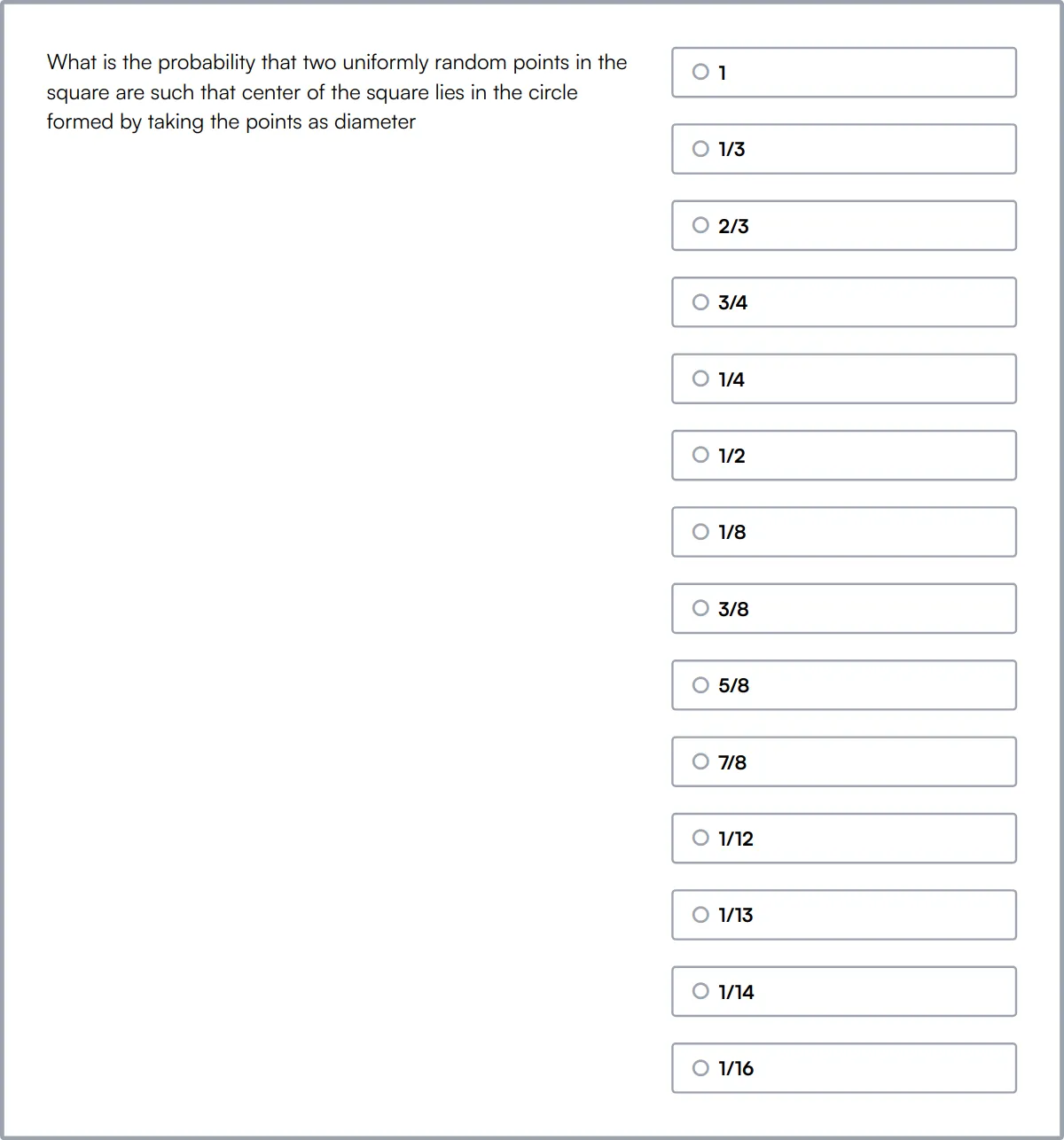
Basic Computer Skills Test
Our Basic Computer Skills Test evaluates a candidate's knowledge of fundamental computer skills, including data entry, Linux, Excel, computer programming aptitude, shell scripting, typing, system administration, and data analysis.
The test assesses skills in basic computer operations, data entry, Excel, typing, and system administration. Candidates will navigate through MCQs that test their understanding of essential computer skills.
Successful candidates demonstrate proficiency in basic computer operations and data entry, showing their ability to handle everyday computer tasks efficiently.
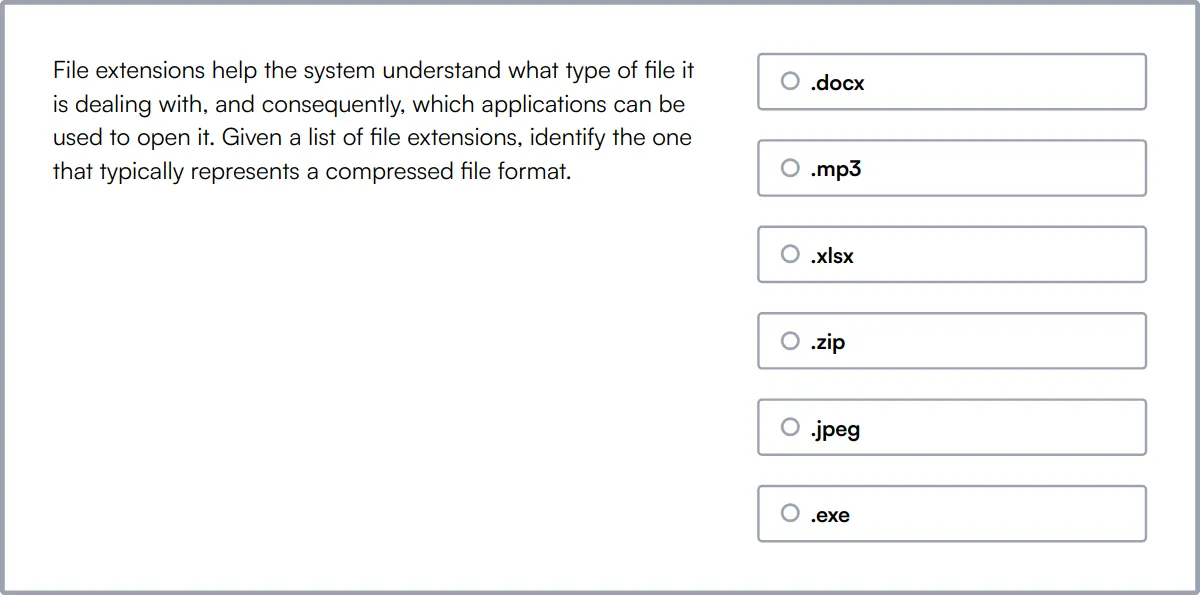
Summary: The 8 key HR Analyst skills and how to test for them
| HR Analyst skill | How to assess them |
|---|---|
| 1. Data Analysis | Evaluate a candidate's ability to interpret and leverage complex datasets. |
| 2. Statistical Knowledge | Test understanding of statistical theories and methods relevant to HR data. |
| 3. HR Metrics | Assess familiarity with key HR metrics and their application in strategies. |
| 4. Reporting Skills | Review proficiency in creating clear, comprehensive HR reports and presentations. |
| 5. Survey Design | Examine ability to design effective surveys that gather meaningful data. |
| 6. Predictive Analytics | Check capability to use historical data to forecast HR trends. |
| 7. Technology Proficiency | Verify adeptness with HRIS and other relevant software tools. |
| 8. Problem Solving | Observe problem-solving skills through scenario-based assessments. |
Customer Success Test
HR Analyst skills FAQs
What are the key data analysis skills required for an HR Analyst?
HR Analysts should be proficient in data collection, data processing, and data interpretation. They need to use statistical tools and software to analyze HR data and generate insights that support decision-making.
How can HR Analysts use predictive analytics effectively?
Predictive analytics in HR involves using historical data to forecast future outcomes. HR Analysts should be skilled in applying predictive models to areas like employee turnover, performance, and recruitment success, helping organizations plan better strategies.
What role does technology proficiency play in the effectiveness of an HR Analyst?
Technology proficiency is key for HR Analysts as they often use advanced HRIS (Human Resources Information Systems) and analytics software. This skill ensures they can manage data accurately and streamline HR processes.
Why is legal knowledge important for HR Analysts?
HR Analysts must understand employment laws and regulations to ensure that data handling and HR practices comply with legal standards. This knowledge helps prevent legal risks and promotes ethical standards within the organization.
How can HR Analysts improve their reporting skills?
Improving reporting skills involves mastering data visualization tools and techniques. HR Analysts should focus on creating clear, concise, and actionable reports that effectively communicate findings to stakeholders.
What is the importance of communication skills in the HR Analyst role?
Effective communication is critical for HR Analysts to convey data insights and recommendations to a non-technical audience. They must be able to translate complex data into understandable and useful information.
How does project management contribute to the success of HR Analysts?
Project management skills enable HR Analysts to handle multiple projects efficiently, meet deadlines, and coordinate with different departments. This skill ensures that data-driven projects align with organizational goals.
What are some methods to assess multitasking abilities in potential HR Analyst hires?
To assess multitasking abilities, recruiters can use behavioral interview questions, simulate real-world scenarios requiring juggling multiple tasks, or review past experiences where the candidate managed several projects simultaneously.
Assess and hire the best HR Analysts with Adaface
Assessing and finding the best HR Analyst is quick and easy when you use talent assessments. You can check out our product tour, sign up for our free plan to see talent assessments in action or view the demo here:

40 min skill tests.
No trick questions.
Accurate shortlisting.
We make it easy for you to find the best candidates in your pipeline with a 40 min skills test.
Try for freeRelated posts
Free resources



